Comparative Literature
2022-2023 Courses
Spring 2023
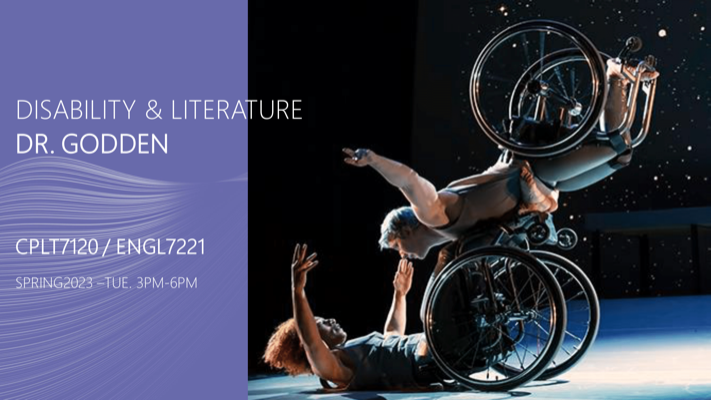
CPLT 7120 (section 1) / ENGL 7221: Disability and Literature
Instructor: Dr. Richard Godden
Time: 3:00 - 6:00 PM
This course will introduce you to Disability Studies and to the study of disability in literature. We will consider varied representations of disability, including physical, cognitive, and sensory impairments. Often viewed merely as moral symbols or instances of sentimentality and pathos, we will explore how figures of disability challenge and interrogate such familiar concepts as normal or human. What do these terms mean? Who decides? We will pay special attention to how disability intersects with gender and race, and we will also examine related concepts, such as monstrosity and posthumanism. Readings will include literary texts and selections from theoretical texts.
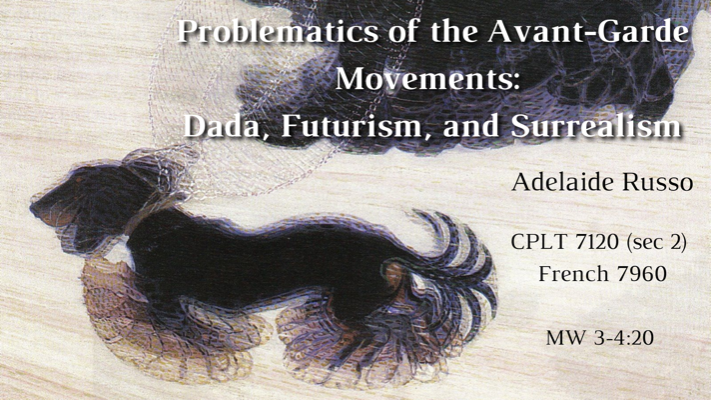
CPLT 7120 (section 2) / FREN 7960: Problematics of the Avant-Garde Movements : Dada, Futurism, and Surrealism
Instructor: Dr. Adelaide Russo
Time: MW 3:00 - 4:20 PM
Course Objectives: 1) to introduce students to the historical avant-garde movements in the twentieth century – Dada, Futurism, Surrealism – in literature, the plastic arts, and music: 2) to investigate the problematic nature of the concept of the avant-garde through the analysis of its political, national, and philosophical implications as well as the transnational circulation of avant-garde movements from Europe to the Americas through the study of the major theoretical texts on the topic: 3) to examine the interrelatedness of the arts, and the group dynamics of artistic movements, including the treatment of the status of women as independent participants, and as collaborators in these groups, and the artistic influences derived from African and indigenous art forms.
Required Readings include the works of the major theorists – Walter Benjamin, Renato Poggioli, Peter Bürger, Marjorie Perloff, Martin Puchner, Susan Suleiman – and contemporary reactions to their formulations. Students will be introduced to the major manifestos for each movement pertaining to literature, painting, music, and the general aesthetic principles of each writer, painter, or composer addressed. Some of the major figures include: André Breton, Tristan Tzara, Marinetti, Valentine de Saint-Point, Marcel Duchamp, Robert Desnos, Rrose Sélavy, Georges Bataille, Michel Leiris, Picasso, André Masson, Antonin Artaud, Hugo Ball, Luigi Russolo, Leonora Carrington, etc. They will also study collective efforts such as the literary, journals, and group activities – Cabaret Voltaire; Centrale Surréaliste.
Required work: A short critical paper on the theory of the avant-garde ( 5 to 7 pages) and a research paper or artistic project developed in consultation with the instructor (15-25 pages) which compares the work of at least three artists, writers, or composers. Grade Distribution: 20% Class Participation; 20% Short Paper: 20% Oral Presentations (2); Research Paper 40%. Students in Music or the Plastic Arts can submit a creative project in lieu of a research paper. The course will be taught in English. A high-level reading knowledge of French is required, and reading knowledge of Italian, German, or Spanish is most desirable.
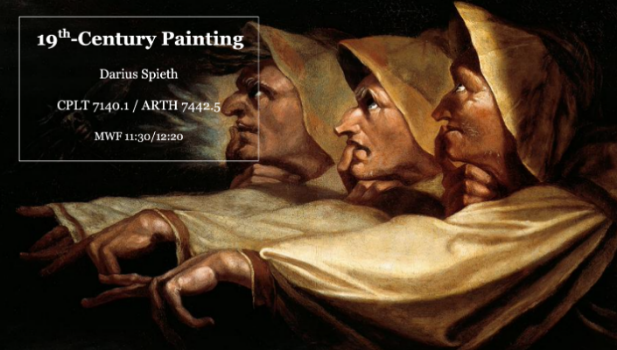
CPLT 7140 (section 1) / ARTH 7442: 19th Century Painting
Instructor: Dr. Darius Speith
Time: MWF 11:30 - 12:20
This course surveys the principal painters and artistic developments in Europe during
the nineteenth century. Special attention is devoted to France, England and Germany,
where changes in institutional structures specific to the art and literary worlds,
shifts in political circumstances, social upheavals, and technological innovations
forced artists to constantly reinvent their role in society. Among the nineteenth-century
art movements covered in greater depth are Neoclassicism, Romanticism, Realism, Impressionism
and Post-Impressionism. We will conclude the class with a discussion how the nineteenth
century helped define twentieth-century notions of modernism.
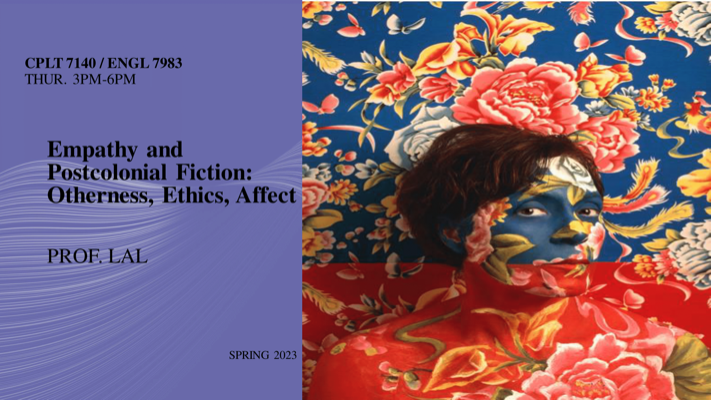
CPLT 7140 (section 2) / ENGL 7983 : Empathy and Postcolonial Fiction: Otherness, Ethics, Affect
Instructor: Dr. Samuya Lal
Time: Th 3:00 - 6:00 PM
This course will explore how postcolonial fiction engages the ethical and affective ambiguities of empathy. Reading fiction by writers such as Aminatta Forna, Chris Abani, Hisham Matar, J.M. Coetzee, Kamila Shamsie, Mirza Waheed, and Yaa Gyasi, we will ask: what role does empathy play in discourses of otherness, othering, universalism, and essentialization? How does empathy interact with different affects and emotions to shape one’s relationships with others and oneself? How does postcolonial fiction evoke readers’ empathic responses, and how does it attune readers to the ethical and political implications of those responses? In addition to studying focused works on empathy, we will read theoretical texts across the fields of postcolonial studies, affect studies, and literary ethics; the reading list may include texts by Achille Mbembe, Ato Quayson, Frantz Fanon, Jacques Derrida, Gayatri Spivak, Leela Gandhi, Sara Ahmed, and Sianne Ngai.
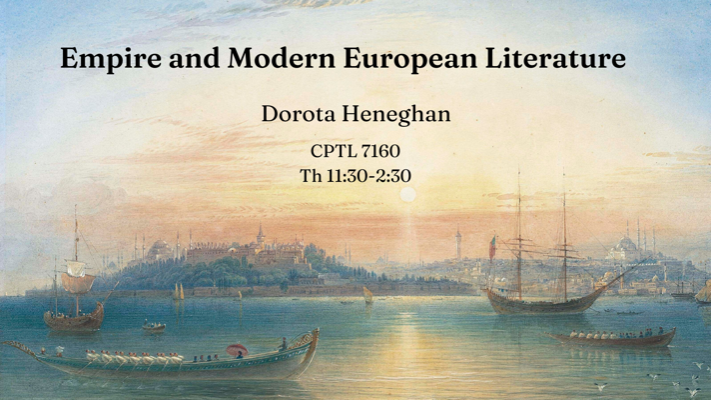
CPLT 7160 : Empire and Modern European Literature
Instructor: Dr. Dorota Heneghan
Time: Th 11:30-2:30
This course will examine the literary, aesthetic, and political currents that shaped and knit together the Atlantic world in the nineteenth-century and postcolonial Europe. We will discuss how historical processes (and fantasies) of empire-building, colonialism and its legacy, and migration were inextricably tied to national identities and cultural relations beyond the colonial past. How did Spanish, British, Slavic, Scandinavian, and Swiss authors address the intersections of colonialism, race, and gender in their narratives, letters, memoirs, and travelogues? We will pay special attention to differences in which women and men experience imperialism, the emergence of global consciousness, and the rich and complex relations that prompt us to shift our focus from local, regional, and national literary and cultural traditions to sociocultural and artistic interactions across the Atlantic and beyond. Readings will include texts by Benito Pérez Galdós, Henryk Sienkiewicz, Evelyn Waugh, Max Frisch, Isak Dinesen, and Karen Blixen.
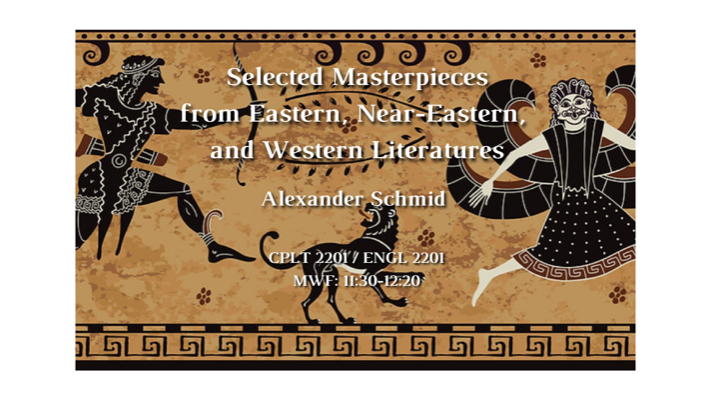
CPLT 2201 / ENGL 2201: Introduction to World Literary Traditions: Selected Masterpieces from Eastern, Near-Eastern, and Western Literature
Instructor: Alexander Schmid
Time: MWF 11:30 - 12:20
Join me on an epic quest through several masterpieces of Western and Near-Eastern
Literature.
This Fall, we will begin our exploration in the cradle of civilization with Gilgamesh
and Enkidu. We will then proceed through Archaic Greece on an Odyssey with Homer to the isle of Lesbos to visit the poet Sappho. From those high seas,
we will make the narrow crossing across the Ionian Sea to visit Rome, and there we
will learn from Virgil's Aeneid the epic roots of the Roman Empire. From Rome, we will venture still west to the
land of King Arthur, and there we will encounter the tale of Beowulf and the terrible
Grendel. From the lonely island, we will voyage to Murasaki Shikibu’s 11th century
Japan, and selections from her The Tale of Genji. We then sojourn back west to Syria, and there we will encounter Scheherazade and
her Thousand and One Nights. We will conclude with short selections from four final masterpieces: Dante’s Divine Comedy, Christine de Pizan’s The Book of the City of Ladies, Chaucer’s The Knight’s Tale (from The Canterbury Tales), and John Milton’s Paradise Lost.
During our junket, we will be guided by the following overarching questions: (1) What
makes a piece of literature a masterpiece? (2) How does a masterpiece relate to the
genre of Epic in the ancient, medieval, and Early Modern worlds? (3) What does it
mean for a work of literature to be a masterpiece of world literature? (4) How does
the concept of world literature differ from a specific national literature, like Italian
literature or Japanese literature? (5) What does it mean to read literature in translation?
Required Texts:
1. Anonymous. The Epic of Gilgamesh: the Babylonian Epic Poem and Other Texts in Akkadian and Sumerian. Trans. Arthur George. Penguin Books, 2020. ISBN: 978-0140449198
2. Homer. The Odyssey of Homer. trans. Richmond Lattimore. Harper Perennial Modern Classics, 2007. ISBN: 978-0060904791
3. Virgil. The Aeneid of Virgil. Translated by Allen Mandelbaum, Bantam Classics; Revised Ed., 1981. ISBN: 978-0553210415
4. Anonymous. Beowulf. Trans. Seamus Heaney, 1st ed., W. W. Norton & Company, 2001. ISBN: 978-0393320978
5. Anonymous. The Book of the Thousand Nights and One Night. Translated by J.C. Mardrus and Powys Mathers, 1st ed., II, Routledge, 1990. ISBN:
978-0415045407
6. Milton, John. Paradise Lost. Edited by Gordon Teskey, 2nd ed., W. W. Norton & Company, 2020. ISBN: 978-0393617085
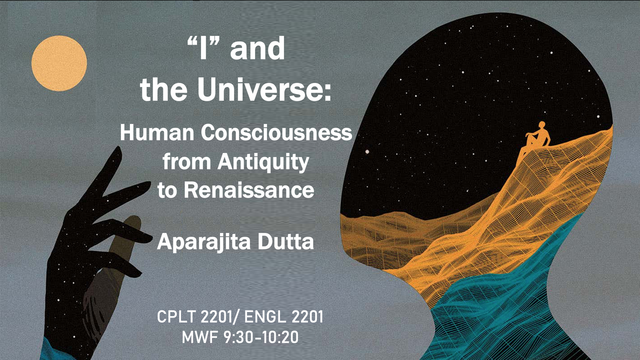
CPLT 2201/ENGL 2201 (Section 002): Introduction to World Literary Traditions: "I"
and the Universe: Human Consciousness from Antiquity to Renaissance
Instructor: Aparajita Dutta
Time: MWF 9:30 - 10:20
From the concepts of “Shabda Brahma”—or the power of the word (Devisukta, Rig Veda)—to the turbulence of religion, our consciousness has evolved in multifarious ways since ancient times, manifesting in literature from all over the world. This plethora of creativity ranges from the great epics to tales written during plagues. The course surveys different ways human beings look at the world, expressing their identities and their emotions. While reading individual texts critically and analytically, we will also follow a comparative methodology by traveling across the whole world, taking a sip of wisdom from the Vedas, sailing with Gilgamesh through the shores of Mesopotamia, and reliving the floods of Noah’s ark. We will then move forward to medieval times, witnessing a harmonious religious conglomeration of Sufi and Bhakti poets of South Asia, of Rumi, and experiencing the chivalrous tales of the west. The tales of Arabian Nights and plague tales of The Decameron will sail us through the end of the medieval era, and we will be a witness to the rationalism of Renaissance. To offer more depth to our understanding, we will also spend a little time analyzing the contemporary references and reception of these texts. The primary questions we will be keeping in mind throughout the course will be:
· How is the human located in the text?
· How is the human consciousness reflected in the text?
· Comparative analyses of the texts
Texts: All texts will be provided by the instructor.
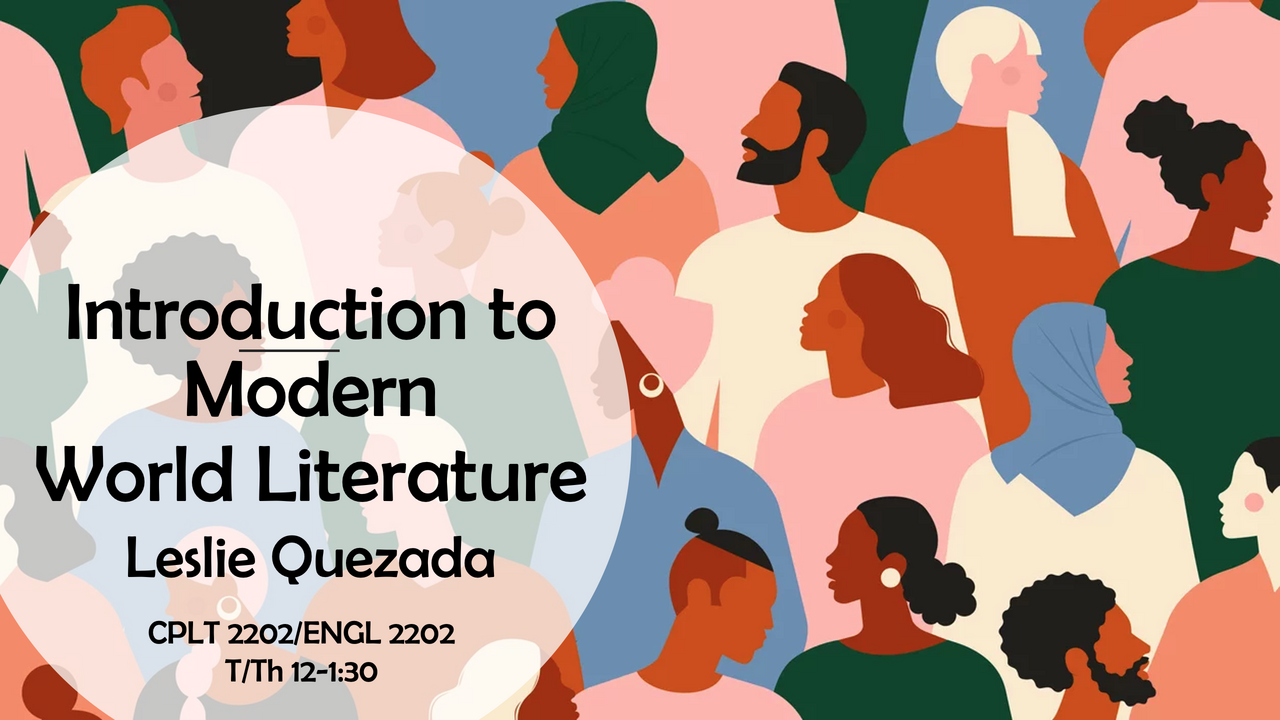
Instructor: Leslie Quezada
This course focuses on representative works of modern and contemporary world literature by authors such as Henrik Ibsen, Gustave Flaubert, Federico García Lorca, Lois Lowry, and Indra Sinha. From Like Water for Chocolate to The Kite Runner, we will investigate representations of identity and culture through a central theme of nationalism, which will help guide our reading and analysis. The goal of this course is to introduce students to cultural diversity in a variety of literary traditions and genres, including novels, short-stories, film, poetry, and semi-autobiographical fiction. This course will also introduce foundational concepts and theories of world literature as an exciting field of study.
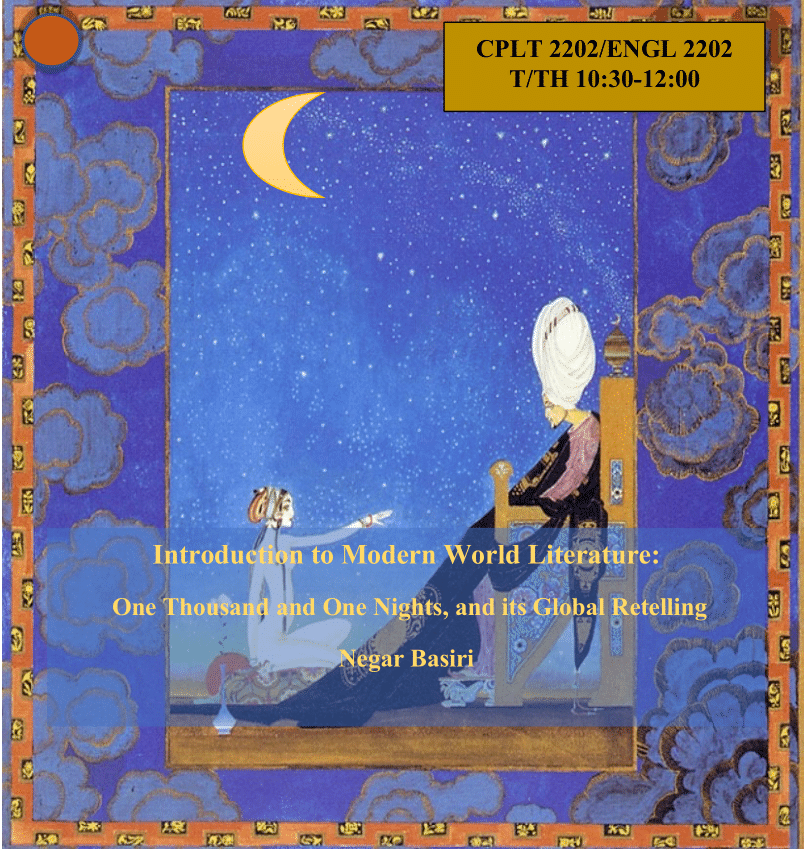
CPLT 2202/ENGL 2202 (Section 002): Introduction to Modern World Literature: One Thousand and One Nights and its Global Retelling
Instructor: Negar Basiri
Time: T/Th 10:30-12:00
“Los siglos pasan y la gente sigue escuchando la voz de Shaharazad:” (“The centuries go by, and we are still hearing the voice of Scheherazade”)
With this simple sentence, Borges pays tribute to the enduring impact of The Arabian Nights in shaping world literature. An unparalleled monument to the ageless art of storytelling, the tales of the One Thousand and One Nights have, for many centuries, titillated the imaginations of generations the world over. It is perhaps one of the greatest Middle Eastern contributions to world literature. In various forms and genres, it has influenced literature, music, art, and cinema, and continue to do so until our present day. Whether through its folktales, its magical stories full of adventure, or through its modern depictions as Hollywood feature films or Disney animated movies, almost everyone has been influenced to some extent by at least one or another of Shahrazad’s dazzling stories of the exotic East. Indeed, one would be hard-pressed to find anyone not familiar with the stories of Aladdin, Ali Baba, or Sindbad among many others, or with such terms as genie and ghoul, all of which became known to the West through the tales of One Thousand and One Nights.
In this course, we will read, watch, and listen to modern literary texts from around the world that directly reflect their reception of this classic text. The underlying preoccupation of this course is to examine narrative transformations of stories across historical and geographical barriers, addressing questions such as how do stories change in their travel from one culture to another, from one era to another and from one medium to another?
Fall 2022
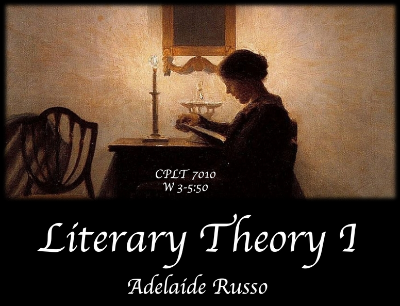
CPLT 7010: Literary Theory I
Instructor: Dr. Adelaide Russo
Time: W 3:00 - 5:50
Comparative Literature 7010 provides students with training in bibliography and documentation
as they address the foundations of European Literary Theory and Criticism from Antiquity
to the
Romantic Period. Readings include: from Antiquity: Plato, Aristotle, Horace, Longinus,
Quintilian, Plotinus; Medieval: Augustine of Hippo, Moses Maimonides, Thomas Aquinas,
Dante, Boccaccio; Christine de Pisan; Renaissance: Joachim Du Bellay, Sir Philip Sidney; Neo-
Classicism to the Enlightenment: Pierre Corneille, John Dryden, Giambattista Vico, Kant,
Hume, Edmund Burke, Lessing, Hegel, Madame de Staël, Mary Wollstonecroft; Romantic
Period: Wordsworth, Coleridge, Schlegel, Shelley; and Emerson. Students will become
aware of
the evolution of literary genres, of the role of literature and authors in society,
the relationship of
philosophy and religious thought to literature, and the relationship of poetry to
the other arts.
They will explore the notions of mimesis, irony, the sublime, and the role of the
imagination as
well as becoming familiar with basic rhetorical figures and argumentative strategies.
Students
will be required to prepare an annotated bibliography, 5 to 7 discussion questions
and a ten
minute (maximum) oral class presentation of two texts, and a 15- to 20-page final
research paper.
Students will work in pairs for the bibliography and the class presentations of the
readings. The
written versions of the presentations and the bibliography are due the week following
the oral
presentations. Required Text: Williams, Leitch, Cain, Finke, Johnson, McGowan, The Norton
Anthology of Theory and Criticism, 3rd Edition. Additional Xeroxed materials will be provided.
Contact Adelaide Russo at frruss@lsu.edu for further information.
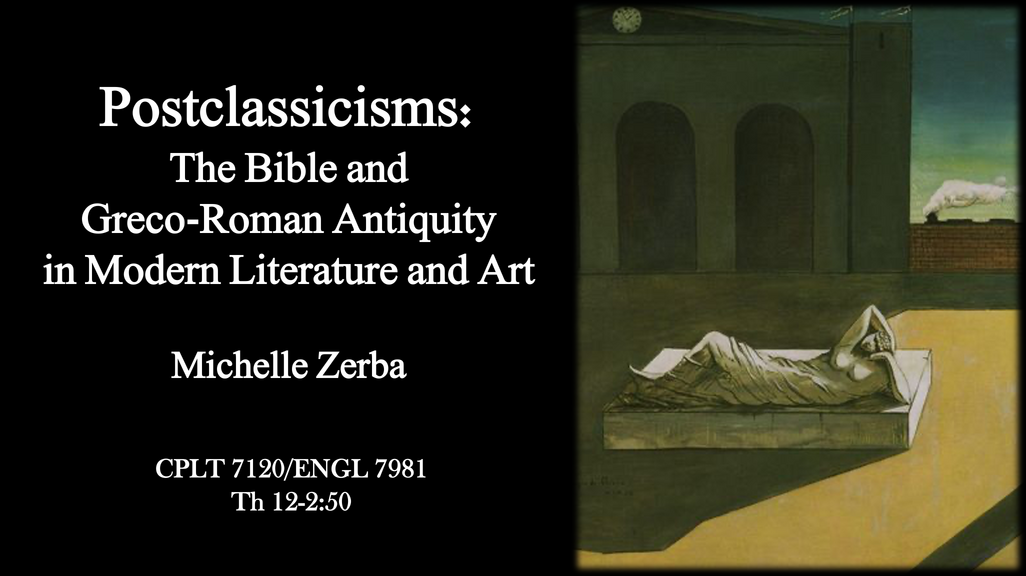
CPLT 7120: Postclassicisms: The Bible and Greco-Roman Antiquity in Modern Literature and Art
Instrucor: Dr. Michelle Zerba
Time: Th 12:00 - 2:50
This course explores the ways in which (early) modern writers and artists draw on Greek and Roman antiquity and the Bible for creative inspiration even as they question its influence and viability. How have “the classics” been constructed, as a critical paradigm, as a resource of the imagination, and as a hegemonic legacy that must be resisted? What values are associated with returns to the ancient worlds of Greece, Rome, and the Bible? We will investigate these questions by examining how figures such as T.S. Eliot, Italo Calvino, Vladimir Nabokov, and Anne Carson approach questions of translation, reception, and adaptation. In addition, we will examine some of the literary tools we use for referencing the classical past, including “genre,” “allusion,” “shadow texts,” and “parody.” Most of the class will focus on studying paired works that enable a better understanding of what “postclassicism” means in relation to modernity and modernism:
· Genesis and Mark Twain’s Diaries of Adam and Eve
· Biblical Apocalypses, the Poetry of William Blake, Byron’s Prisoner of Chillon, and Mary Shelley’s The Last Man
· Virgil’s Aeneid (selections) and Shakespeare’s Hamlet
· Ovid’s Metamorphoses (selections) and Ovid Metamorphosed (a collection of contemporary stories by A.S. Byatt, Margaret Atwood, and others based on Ovid)
· Homer’s Odyssey (selections) and Virginia Woolf’s Orlando / Shakespeare’s Sister (from A Room of One’s Own)
· Poetry of Sappho, Pound & H.D.’s Imagism, and Anne Carson’s If Not, Winter
· Sophocles’ Antigone, Athol Fugard’s The Island, and Femi Osofisan’s Tegonni
· Euripides’ Medea, Black Medeas, and London Stage Adaptations
· Greek Mythical Females and the Art & Poetry of the Pre-Raphaelites
Six short response papers, two oral presentations, and one final research paper or creative project. Reading per week will average 50-75 pages.
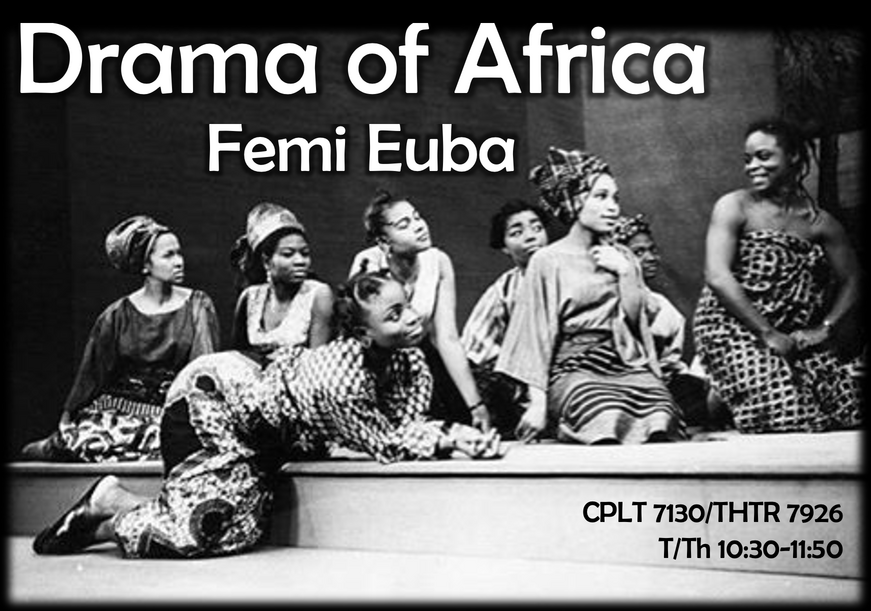
CPLT 7130/THTR 7926: Seminar in the Drama of Africa
Instructor: Dr. Femi Euba
Time: T/Th 10.30-11.50 am
A comparative study of the dramatic and theatrical expressions of the black cultures in Africa, identifying, where possible, not only African influences on some of the dramatic works in the diaspora, but also the Western classical influences on African plays. Works include those by Wole Soyinka, Ngugi wa Thiong’o, Efua Sutherland, Ama Ata Aidoo, Athol Fugard et al, Tewfik al-Hakim, etc.
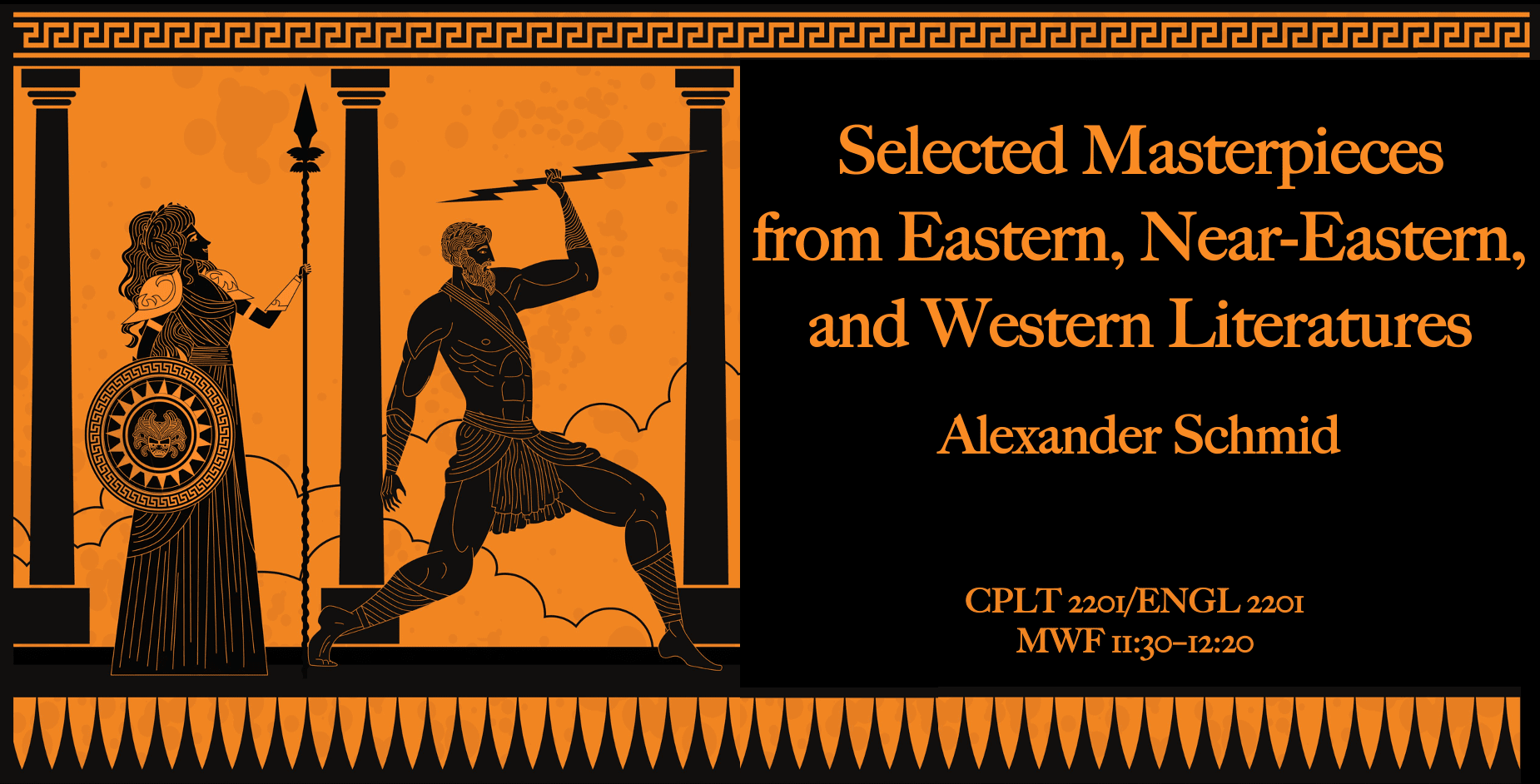
CPLT 2201/ENGL 2201 (Section 001): Introduction to World Literary Traditions: Selected Masterpieces from Eastern, Near-Eastern, and Western Literatures
Instructor: Alexander Schmid
Time: MWF 11:30 AM - 12:20 PM
Join me on an epic quest through several masterpieces of Western and Near-Eastern Literature.
This Fall, we will begin our exploration in the cradle of civilization with Gilgamesh and Enkidu. We will then proceed through Archaic Greece on an Odyssey with Homer to the isle of Lesbos to visit the poet Sappho. From those high seas, we will make the narrow crossing across the Ionian Sea to visit Rome, and there we will learn from Virgil's Aeneid the epic roots of the Roman Empire. From Rome, we will venture still west to the land of King Arthur, and there we will encounter the tale of Beowulf and the terrible Grendel. From the lonely island, we will voyage to Murasaki Shikibu’s 11th century Japan, and selections from her The Tale of Genji. We then sojourn back west to Syria, and there we will encounter Scheherazade and her Thousand and One Nights. We will conclude with short selections from four final masterpieces: Dante’s Divine Comedy, Christine de Pizan’s The Book of the City of Ladies, Chaucer’s The Knight’s Tale (from The Canterbury Tales), and John Milton’s Paradise Lost.
During our junket, we will be guided by the following overarching questions: (1) What makes a piece of literature a masterpiece? (2) How does a masterpiece relate to the genre of Epic in the ancient, medieval, and Early Modern worlds? (3) What does it mean for a work of literature to be a masterpiece of world literature? (4) How does the concept of world literature differ from a specific national literature, like Italian literature or Japanese literature? (5) What does it mean to read literature in translation?
Required Texts:
1. Anonymous. The Epic of Gilgamesh: the Babylonian Epic Poem and Other Texts in Akkadian and Sumerian. Trans. Arthur George. Penguin Books, 2020. ISBN: 978-0140449198
2. Homer. The Odyssey of Homer. trans. Richmond Lattimore. Harper Perennial Modern Classics, 2007. ISBN: 978-0060904791
3. Virgil. The Aeneid of Virgil. Translated by Allen Mandelbaum, Bantam Classics; Revised Ed., 1981. ISBN: 978-0553210415
4. Anonymous. Beowulf. Trans. Seamus Heaney, 1st ed., W. W. Norton & Company, 2001. ISBN: 978-0393320978
5. Anonymous. The Book of the Thousand Nights and One Night. Translated by J.C. Mardrus and Powys Mathers, 1st ed., II, Routledge, 1990. ISBN: 978-0415045407
6. Milton, John. Paradise Lost. Edited by Gordon Teskey, 2nd ed., W. W. Norton & Company, 2020. ISBN: 978-0393617085

CPLT 2201/ENGL 2201 (Section 002): Introduction to World Literary Traditions: "I" and the Universe: Human Consciousness from Antiquity to Renaissance
Instructor: Aparajita Dutta
Time: MWF 9:30 - 10:20
From the concepts of “Shabda Brahma”—or the power of the word (Devisukta, Rig Veda)—to the turbulence of religion, our consciousness has evolved in multifarious ways since ancient times, manifesting in literature from all over the world. This plethora of creativity ranges from the great epics to tales written during plagues. The course surveys different ways human beings look at the world, expressing their identities and their emotions. While reading individual texts critically and analytically, we will also follow a comparative methodology by traveling across the whole world, taking a sip of wisdom from the Vedas, sailing with Gilgamesh through the shores of Mesopotamia, and reliving the floods of Noah’s ark. We will then move forward to medieval times, witnessing a harmonious religious conglomeration of Sufi and Bhakti poets of South Asia, of Rumi, and experiencing the chivalrous tales of the west. The tales of Arabian Nights and plague tales of The Decameron will sail us through the end of the medieval era, and we will be a witness to the rationalism of Renaissance. To offer more depth to our understanding, we will also spend a little time analyzing the contemporary references and reception of these texts. The primary questions we will be keeping in mind throughout the course will be:
· How is the human located in the text?
· How is the human consciousness reflected in the text?
· Comparative analyses of the texts
Texts: All texts will be provided by the instructor.

CPLT 2202/ENGL 2202 (Section 001): Introduction to Modern World Literature
Instructor: Leslie Quezada
Time: T/TH 12:00 PM - 1:30 PM
This course focuses on representative works of modern and contemporary world literature by authors such as Henrik Ibsen, Gustave Flaubert, Federico García Lorca, Lois Lowry, and Indra Sinha. From Like Water for Chocolate to The Kite Runner, we will investigate representations of identity and culture through a central theme of nationalism, which will help guide our reading and analysis. The goal of this course is to introduce students to cultural diversity in a variety of literary traditions and genres, including novels, short-stories, film, poetry, and semi-autobiographical fiction. This course will also introduce foundational concepts and theories of world literature as an exciting field of study.

CPLT 2202/ENGL 2202 (Section 002): Introduction to Modern World Literature: One Thousand and One Nights and its Global Retelling
Instructor: Negar Basiri
Time: T/Th 10:30-12:00
“Los siglos pasan y la gente sigue escuchando la voz de Shaharazad:” (“The centuries go by, and we are still hearing the voice of Scheherazade”)
With this simple sentence, Borges pays tribute to the enduring impact of The Arabian Nights in shaping world literature. An unparalleled monument to the ageless art of storytelling, the tales of the One Thousand and One Nights have, for many centuries, titillated the imaginations of generations the world over. It is perhaps one of the greatest Middle Eastern contributions to world literature. In various forms and genres, it has influenced literature, music, art, and cinema, and continue to do so until our present day. Whether through its folktales, its magical stories full of adventure, or through its modern depictions as Hollywood feature films or Disney animated movies, almost everyone has been influenced to some extent by at least one or another of Shahrazad’s dazzling stories of the exotic East. Indeed, one would be hard-pressed to find anyone not familiar with the stories of Aladdin, Ali Baba, or Sindbad among many others, or with such terms as genie and ghoul, all of which became known to the West through the tales of One Thousand and One Nights.
In this course, we will read, watch, and listen to modern literary texts from around the world that directly reflect their reception of this classic text. The underlying preoccupation of this course is to examine narrative transformations of stories across historical and geographical barriers, addressing questions such as how do stories change in their travel from one culture to another, from one era to another and from one medium to another?